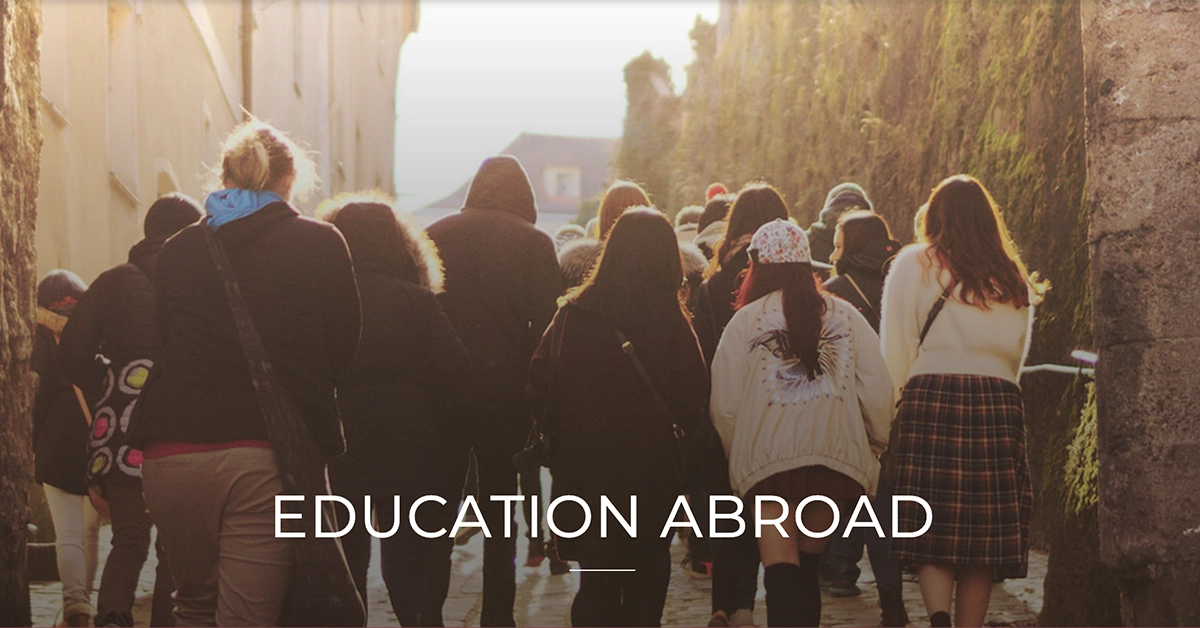In the crazy world of university life, there’s an exhilarating opportunity that many students may have heard of: studying abroad. Studying abroad is more than just packing your bags and jetting off to a new country; it’s an adventure that transcends the boundaries of the traditional classroom and leaves students with a whole new world of opportunities. But, how do you get from the back row of your PSYC 104 class and commuting home on the LRT to learning in sunny Ecuador or walking home on the cobblestone streets of Sweden? It’s a lot easier than you think, and it’s an experience every university student should consider.
The world of possibilities
Studying abroad is about much more than earning academic credits; it’s an eye-opening experience that offers a unique blend of cultural immersion, personal growth, and educational enrichment. Why wouldn’t you want to learn history amidst the ruins you read about or conduct research in a vast international city? You can’t forget that you’ll be doing all this surrounded by peers from across the globe, giving you their insights on the same topics. The possibilities are as wide as the world itself.
The process, unpacked
So, how do you go from daydreaming about a foreign adventure to actually living it? The process begins with curiosity and a sense of adventure. MacEwan has a dedicated Education Abroad team ready to guide students through every step of the journey.
1. Information sessions:
These sessions are the key to unlocking the door to the world. They are your first step into the world of study abroad. Attendees get first-hand insights from past study abroad students, learn about available programs, and receive a roadmap for the application process. These sessions are not just informative; they’re inspirational. And remember, it’s never too early to start thinking about next year’s programs even if you missed the recent application deadline. If placements are available, the next deadline for last-minute applications for the Winter 2025 term will be Oct. 1, 2024.
2. Browsing programs:
MacEwan offers a variety of study abroad programs to suit different interests and academic pursuits. Whether you’re into language immersion, research projects, or internship opportunities, there’s a program for you. You’ll hear all about them at the information session, but the trick is to find the one that aligns with your academic and personal goals. There are plenty of things to consider when trying to find your match. Do you want to go for one or two terms, or is a summer program more your style? Maybe you’re at a place in your studies where an internship is better suited for you. MacEwan Abroad can connect students with internship opportunities that allow them to gain work experience abroad. These internships usually run for two to four months over the summer or during semesters. Of course, you also have to decide where on earth (literally) you want to go. Your options will vary depending on your program of study here at MacEwan and what you hope to study during your time abroad.
MacEwan has partner institutions all over the world. You can find them in Australia, Austria, Czech Republic, Ecuador, Finland, and more. Each institution offers its unique culture and qualities to those studying with them.
3. The application process:
Once you’ve attended an information session and found a program that catches your eye, you can make an appointment with MacEwan Abroad. They’ll help ensure seats are still available, make sure that it’s a good match for you, and provide detailed information about your program of interest. MacEwan Abroad can also connect you to volunteers who have gone to your hopeful destination, giving you firsthand insights into what your time abroad could look like. You’ll meet with a program or academic advisor from your MacEwan program of study. They’ll advise you on your academic planning and ensure the courses you plan to take will transfer back to your program credits at MacEwan University. The application process is the next exciting step. Submitting a CV, writing a compelling letter of intent, and securing a signed program approval form are all part of the process. It may sound daunting, but it’s important to remember that the Education Abroad team is there to assist you at every turn.
4. The waiting game:
Now that all your documents are submitted, you’ll sit tight and wait to hear back from MacEwan Abroad. Students who are selected will be nominated to the host institution and must go through another application process. This part of the process sounds much more intimidating than it is, and it’s important to remember you can seek support at any time. The Education Abroad team will be right by your side throughout the process to help you with anything you need.
5. Start packing your bags:
You’ll receive a letter of acceptance from your host institution at this step. Congratulations! Now, things are starting to feel real! It’s time to make your travel arrangements. Flights, visas, health insurance, and accommodations (if applicable) are important things to consider now. You’ll also register with MacEwan’s Emergency Response Services at least 30 days prior to departing. Before you head out for the adventure of a lifetime, you’ll attend a mandatory pre-departure orientation. Here, you’ll meet other students about to embark on their own journey studying abroad and students who have previously studied abroad. They’ll share their insights, their dos and don’ts, and you’ll leave the orientation feeling confident about the journey you’re about to take.
Breaking Down the Requirements
Now, you might wonder, “What are the minimum requirements?” Don’t worry; the criteria are more accessible than you think.
Academic standing:
Study abroad programs require students to have completed at least 24 credits at MacEwan University, hold a cumulative minimum of 2.5 GPA, and be registered in a full-time degree program preceding the exchange program. The goal is to ensure that students are academically prepared to make the most of their time abroad. Travelling anytime after your second year is possible, but students often study abroad in their third year. Every program is different, so it’s important to research individual program requirements as some may require students to be more advanced in their studies. It’s important to know that from a language perspective, all classes are in English, except for specific language courses. So, you do not need to be fluent in another language to do this, but if that’s your goal, there are plenty of opportunities.
MacEwan International engagement coordinator Jonathan Martens, suggests keeping your electives as open as possible. This is because getting higher-level core courses abroad, though not impossible, is harder than finding electives. So, take your most essential and specific classes here at MacEwan, and save the broad electives for your adventure abroad.
Financial considerations:
Finances can be a concern for many students, but studying abroad is more achievable than you might think. Scholarships, grants, and financial aid are often available. This includes the International Education Abroad Award which ranges from $500 to $4500 depending on the duration of your stay abroad. Martens notes that students pay tuition here at MacEwan as opposed to paying the host institution. He also shared that the cost-of-living isn’t as expensive as it is here. Students are encouraged to apply for any grants, scholarships, or bursaries they are eligible for. They can also seek advice from the finance team at MacEwan. Additionally, MacEwan International offers advice on budgeting and financial planning which makes the dream of studying abroad financially feasible.
Personal readiness:
Studying abroad is far more than just an academic endeavour; it’s a journey that requires adaptability, resilience, and an open mind. This will provide you the ability to embrace new cultures, navigate unfamiliar environments, and build connections with people from diverse backgrounds. This is an opportunity to grow personally and expand your worldview.
Martens shares that studying abroad is a great chance to get out of your comfort zone and live in a foreign country (not just travel there). You’ll be able to develop yourself personally, academically, and professionally. Due to the unique intercultural environment and study opportunities, he describes this as a transformative experience where you can grow maturity and independence. You will meet so many interesting people, and it will be easy to connect with others. This is because common ground is abundant when studying with other exchange students abroad.”The main idea is ‘don’t be afraid!’” he says. “This will go down as one of the best, if not the best, experiences of your life. I have so many volunteers and alumni who agree.”
Conclusion: a journey worth taking
In the broken-record world of university life, studying abroad is a beacon of excitement that offers students the chance to transcend the boundaries of the classroom and embark on an adventure that will shape their academic and personal journey. With MacEwan’s dedicated Education Abroad team by your side, the world becomes your classroom, and the experiences you gain will be a treasure for a lifetime. So, why not turn those daydreams into reality and take that next step?
Connect with the experts
Whether you’re a seasoned traveller or a first-time adventurer, MacEwan’s Education Abroad advisors are here to support you. Browse the website, attend an info session, and reach out via email, or drop by their office, located in 7-105 for a friendly chat. They have a wealth of information, resources, and personal experiences to share.
Photo from Education Abroad on MacEwan Website





Excellent writing! These are super helpful insights and information for anyone considering this opportunity.